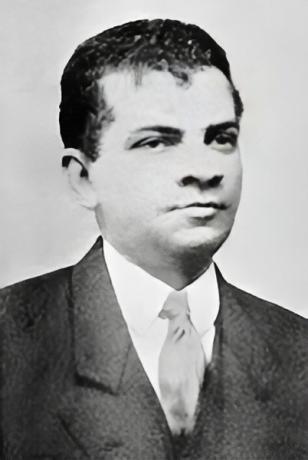THE Song of Exile, which begins with the lines "My land has palm trees, where the Sabiá sings", was published in 1857 in the book “Primeiros Cantos”.
It is one of the best known lyrics by the Brazilian romantic poet Gonçalves Dias:
"My land has palm trees,
Where the Sabiá sings;
The birds, which chirp here,
It doesn't chirp like there.
Our sky has more stars,
Our floodplains have more flowers,
Our forests have more life,
Our loves more life.
In brooding, alone, at night,
More pleasure I find there;
My land has palm trees,
Where the Sabiá sings.
My land has primes,
Such as I do not find here;
In brooding — alone, at night —
More pleasure I find there;
My land has palm trees,
Where the Sabiá sings.
Don't let God let me die,
Without my going back there;
Without enjoying the primes
That I don't find around here;
Without even seeing the palm trees,
Where the Sabiá sings."
Poem Analysis
Without a doubt, Gonçalves Dias' “Canção do Exílio” is one of the most emblematic poems from the early stages of romanticism.
In it, the author expresses the boastful nationalism through the exaltation of nature.
Composed of five stanzas, three quartets and two sextets, the author wrote this poem in July 1843, when he was studying Law at the University of Coimbra, in Portugal. So, missing his country, he felt exiled.
This longing is quite evident in the last stanza, in which the poet expresses his desire to return:
"Don't let God let me die,
Without my going back there;".
It is interesting to note that two verses from Canção do Exílio are mentioned in the Brazilian National Anthem, composed in 1822: “Our woods have more life, Our life, (in your bosom) more loves”.
Intertextuality in the Song of Exile
Many authors parodied or paraphrased the “Song of Exile”. The versions of modernist writers Murilo Mendes, Oswald de Andrade and Carlos Drummond de Andrade stand out.
Parody is a literary genre, generally critical, humorous or ironic. She uses intertextuality in order to recreate a new text, based on an existing famous text.
Likewise, paraphrase is a type of intertextuality that recreates the idea of an existing text, however, using other words.
Note that Murilo Mendes' "Canção do Exílio" as well as Oswald's "Canto de Regresso à Patria" are parodies. Drummond's “Nova Canção do Exílio” and Casimiro de Abreu's “Canção do Exílio”, in turn, are paraphrases.
read Intertextuality and Parody and Paraphrase.
Song of Exile
"My land has California apple trees
where they sing gaturamos from Venice.
the poets of my land
are blacks who live in amethyst towers,
army sergeants are monists, cubists,
philosophers are Poles selling on installments.
we can't sleep
with the speakers and the mosquitoes.
The sururus in the family have Gioconda as a witness.
I die suffocated
in a foreign land.
our flowers are prettier
our most delicious fruits
but they cost a hundred thousand reis a dozen.
Oh, I wish I could suck a real carambola
and listen to a sure old thrush!"
(Murilo Mendes)
Homeland Corner
"My land has palms
where the sea chirps
the birds here
They don't sing like the ones over there
My land has more roses
And there are almost more loves
My land has more gold
my land has more land
gold earth love and roses
I want everything from there
don't let god let me die
without me going back there
don't let god let me die
Without going back to São Paulo
Without seeing 15th Street
And the progress of São Paulo."
(Oswald de Andrade)
Song of Exile
"If I have to die in the prime of years
My God! don't be already;
I want to hear it in the orange tree, in the afternoon,
Singing the thrush!
My God, I feel and you can see that I'm dying
Breathing this air;
Make me live, Lord! give me again
The joys of my home!
the most beautiful foreign country
What the homeland does not have;
And this world is not worth one kiss
So sweet of a mother!
Give me the gentle places where I played
There on the children's court;
I can see the sky of the motherland once,
The sky of my Brazil!"
(Casimiro de Abreu)
New Song of Exile
"a thrush in the
palm tree, far away.
these birds sing
another corner.
the sky sparkles
about damp flowers.
voices in the forest,
and the greatest love.
only, at night,
would be happy:
a thrush,
in the palm tree, far away.
where everything is beautiful
it's fantastic,
only, at night,
would be happy.
(A thrush in the palm tree, far away.)
Still a cry of life and
come back
where everything is beautiful
it's fantastic:
the palm tree, the thrush,
the far."
(Carlos Drummond de Andrade)
Gonçalves Dias and Romanticism
Gonçalves Dias (1823-1864) was a poet, professor, lawyer, playwright, ethnologist and journalist from Maranhão. first phase of romanticism (1836-1852).
The main characteristic of this period was the search for a national identity, expressed by the nationalism-Indianism binomial.
Brazil's break with Portugal led to Brazil's independence, which took place in 1822.
This would be a defining moment for the development of an art that focused on Brazilian aspects.
Therefore, nationalism and pride are the main characteristics of this initial phase, together with the theme of the Indian, chosen as the national hero.



